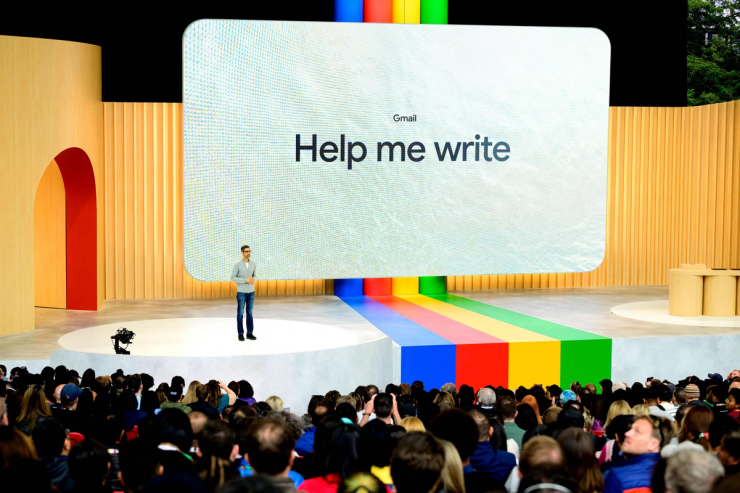The News
Google announced 25 new AI-powered products at its annual I/O developer conference Wednesday, including a glimpse into how its core business — search — will change because of advances in artificial intelligence.
The biggest news for people following the AI race:
- The “Search Generative Experience,” which marries traditional search with an AI chat-like experience, will soon be available as part of “Search Labs” to let customers try “experimental” products.
- Google unveiled its latest AI model, PaLM 2, which was trained on academic research papers, medical texts, and more than 100 languages, powering its new AI products.
- Google’s ChatGPT competitor, Bard, will eventually run on Gemini, a new large language model being developed by Google DeepMind.
- Google is incorporating the latest AI models into its Google Workspace products like Docs and Sheets. For instance, customers will be able to create images from text inside Google Slides and make spreadsheets by describing a task, such as planning for a vacation. In a Google Doc, you can write a short description of what you want to create. PaLM 2 will write the rest of the text for you.
- Across its product lines, Google announced new ways for computer coders to work with AI to more quickly write software and then export it into other software development tools like Replit.
“With a bold and responsible approach, we’re reimagining all our core products, including search,” said Google CEO Sundar Pichai on stage at the company’s Shoreline Amphitheatre.
Reed’s view
Google could have released some of these products years ago. The company employs some of the best AI talent in the industry — even if several have left to start their own gigs — and has made seminal discoveries in the field, including the transformer model that makes ChatGPT possible.
But Google kept AI in the background of its products — and fell behind in the consumer chat race — for a simple reason: Its core search business was too good to disrupt. Parent company Alphabet earned about $40 billion last quarter in its “search and other revenue” category, accounting for almost 60% of the firm’s top line. Search ads are more important to Google than the iPhone is to Apple.
And Alphabet wasn’t going to fix what wasn’t broken until it was forced by a fundamental change in the market.
That arrived this year as consumers fell in love with ChatGPT, along with the idea of talking to software in ordinary language, and getting a direct response. Figuring out search keywords now feels old-fashioned. Google can either provide that new experience or risk that consumers will go elsewhere. But it might lose out anyway: Startups like Perplexity see the future in a subscription chat model — far from Google’s dominant ad business.
Alphabet has been sitting on a cash cow that has faced little competition over the years. It’s been coasting while making side bets on ancillary ideas, such as Waymo robo taxis and biotech vertical Calico. Now, the company has to focus all that brain power on Google’s core business.
The View From Google’s bean counters
While it’s still in the experimental phase, it’s clear that the “search generative experience” Google announced Wednesday is the direction core search is headed.
But it’s still moving carefully to try and preserve its search advertising business. Ads in this new product will work the same way they do in the old: Search for a product and you’ll get related ads mixed in with the AI’s results.
“I think as long as users want to make purchasing decisions, and as long as users want to see choices as they make those purchasing decisions, I think there will always be a role for ads there,” said Cathy Edwards, Google’s vice president of search, in an interview.
The same ad system works now because Google is holding back. Its AI models limit the answers to a very structured format that provides space for ads to be inserted into the results.
When users want the chat experience, Google expects them to switch over to Bard, its ChatGPT competitor, for that full blown conversational experience, hallucinations and all.
“We see at this moment that search and Bard are two complementary products that do different things,” Edwards said. “It’s really focused on not how can we just shoehorn a chatbot in there, but how can we really take this product that huge numbers of people use around the world every day and make it better with generative AI?”
Room for Disagreement
Venture capitalist Chamath Palihapitiya said on a recent “All-In” podcast that in the context of AI advances, he doubts Big Tech’s ability to innovate, including Google’s. “The way that they grow is not through innovation,” he said. “If you look at Google, Facebook, Microsoft, and Apple, and ask yourself, when was the last hugely disruptive thing that they’ve created? You’re hard pressed to find something that was even done in the 2010s. At times when they’ve tried to organically innovate, they’ve massively misallocated capital.”
Notable
- This article in Geekflare offers a nice rundown of some basic AI terminology, a breakdown of how traditional search works compared to generative search, and an interesting analysis of what it means for Google’s bottom line.
- The I/O conference comes at a time when the company is particularly on edge, having laid off 12,000 employees in January, The Washington Post reports. According to the article, it’s a time of intense pressure for employees.


